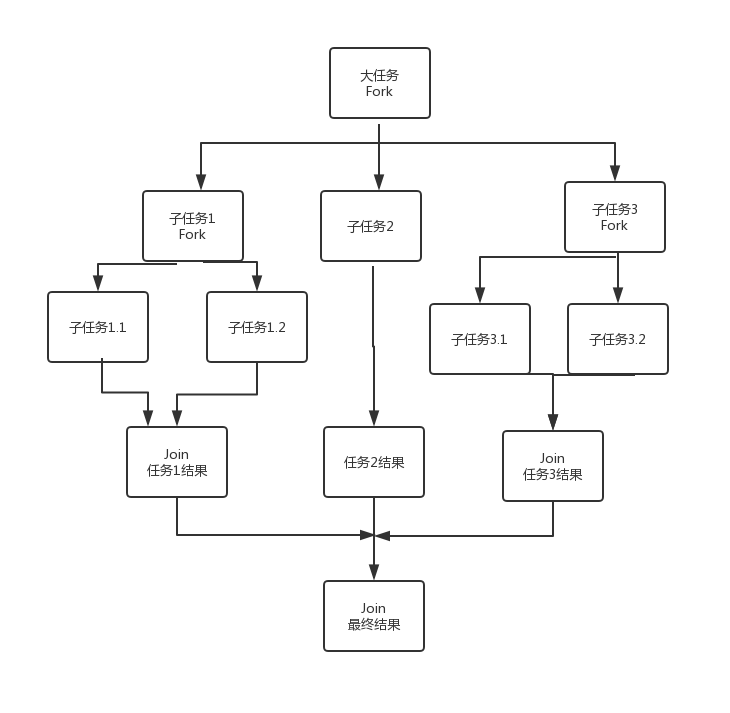社区微信群开通啦,扫一扫抢先加入社区官方微信群

社区微信群
社区微信群开通啦,扫一扫抢先加入社区官方微信群

社区微信群
在JDK1.7版本中提供了Fork-Join并行执行任务框架,它的主要作用是把大任务分割成若干个小任务,再对每个小任务得到的结果进行汇总,此种开发方法也叫分治编程,分治编程可以极大地利用CPU资源,提高任务执行的效率,也是目前与多线程有关的前沿技术。
9.1 Fork-Join分治编程与类结构 
在JDK中并行执行框架Fork-Join使用了“工作窃取”算法,它是指某个线程从其他队列里窃取任务来执行,那这样做有什么好处呢?
比如要完成一个比较大的任务,完全可以把这个大的任务分割为若干个互不依赖的子任务/小任务,为了更加方便地管理这些任务,于是把这些子任务分别放到不同的队列里,这时就会出现有的线程会先把自己队列里的任务快速执行完毕,而其他线程对应的队列里还有任务等待处理,完成任务的线程与其等着,不如去帮助其他线程分担要执行的任务,于是它就去其他线程的队列里窃取一个任务来执行,这就是所谓的“工作窃取”算法。
在JKD1.7中实现分治编程需要使用ForkJoinPool类,此类的主要任务是创建一个任务池,类信息如下:
public class ForkJoinPool extends AbstractExecutorService{
该类也是从AbstractExecutorService类继承下来的
类ForkJoinPool所提供的功能是一个任务池,而执行具体任务却不是ForkJoinPool,而是ForkJoinTask类。
所以需要该类的3个子类CountedCompleter,RecursiveAction,RecursiveTask来实现具体功能。
9.2 使用RecursiveAction让任务跑起来
使用类RecursiveAction执行的任务是具有无返回值的,仅执行一次任务。
public class MyRecursiveAction extends RecursiveAction{
@Override
protected void compute() {
System.out.println("跑起来了");
}
}
..................................
public class Test {
public static void main(String[] args) throws InterruptedException {
ForkJoinPool pool = new ForkJoinPool();
pool.submit(new MyRecursiveAction());
Thread.sleep(5000);
}
}
运行结果:
跑起来了
9.3 使用RecursiveAction分解任务
前面的实例仅是让任务运行起来,并打印一个字符串信息,任务并没有得到fork分解,也就是并没有体现分治编程的运行效果。在调用ForkJoinTask.java类中的fork()方法时需要注意一下效率的问题,因为每一次调用fork都会分离任务,增加系统运行负担,所以在ForkJoinTask.java类中提供了public static void invokeAll(ForkJoinTask<?>t1,ForkJoinTask<?>t2)方法来优化执行效率。
public class MyRecursiveAction extends RecursiveAction{
private int beginValue;
private int endValue;
public MyRecursiveAction(int beginValue,int endValue) {
super();
this.beginValue = beginValue;
this.endValue = endValue;
}
@Override
protected void compute() {
System.out.println(Thread.currentThread().getName()+"------------");
if(endValue -beginValue>2) {
int middelNum = (beginValue+endValue)/2;
MyRecursiveAction leftAction = new MyRecursiveAction(beginValue,middelNum);
MyRecursiveAction rightAction = new MyRecursiveAction(middelNum+1,endValue);
this.invokeAll(leftAction,rightAction);
}else {
System.out.println("打印组合:"+beginValue+"-"+endValue);
}
}
.........................
public class Test {
public static void main(String[] args) throws InterruptedException {
ForkJoinPool pool = new ForkJoinPool();
pool.submit(new MyRecursiveAction(1,10));
Thread.sleep(5000);
}
}
运行结果:
ForkJoinPool-1-worker-3------------
ForkJoinPool-1-worker-3------------
ForkJoinPool-1-worker-3------------
打印组合:1-3
ForkJoinPool-1-worker-3------------
打印组合:4-5
ForkJoinPool-1-worker-5------------
ForkJoinPool-1-worker-5------------
ForkJoinPool-1-worker-1------------
打印组合:9-10
打印组合:6-8
9.4 使用RecursiveTask取得返回值与join()和get()方法的区别
使用get()获得返回值
public class MyRecursiveTask extends RecursiveTask<Integer>{
@Override
protected Integer compute() {
System.out.println("compute time ="+System.currentTimeMillis());
return 100;
}
}
.............................
public class Test1 {
public static void main(String[] args) throws InterruptedException, ExecutionException {
MyRecursiveTask task1 = new MyRecursiveTask();
System.out.println(task1.hashCode());
ForkJoinPool pool = new ForkJoinPool();
ForkJoinTask task2 = pool.submit(task1);
System.out.println(task2.hashCode()+" "+task2.get());
Thread.sleep(5000);
}
}
运行结果:
666641942
compute time =1556522593926
666641942 100
使用join()获得返回值
public class Test2 {
public static void main(String[] args) {
MyRecursiveTask task1 = new MyRecursiveTask();
System.out.println(task1.hashCode());
ForkJoinPool pool = new ForkJoinPool();
ForkJoinTask<Integer> task2 = pool.submit(task1);
System.out.println(task2.hashCode()+"-"+task2.join());
try {
Thread.sleep(5000);
} catch (InterruptedException e) {
e.printStackTrace();
}
}
}
运行结果:
666641942
compute time =1556523044041
666641942-100
方法join()与get()虽然都能取得计算后的结果值,但它们之间还是在出现异常时有处理上的区别。
使用get()方法执行任务时,当子任务出现异常时可以在main主线程中进行捕获。方法join()遇到异常直接抛出。
9.5 使用RecursiveTask执行多个任务并打印返回值
public class MyRecursiveTaskA extends RecursiveTask<Integer>{
@Override
protected Integer compute() {
System.out.println(Thread.currentThread().getName()+"begin A"+System.currentTimeMillis());
try {
Thread.sleep(3000);
System.out.println(Thread.currentThread().getName()+"end A"+System.currentTimeMillis());
} catch (InterruptedException e) {
e.printStackTrace();
}
return 100;
}
}
.......................................
public class MyRecursiveTaskB extends RecursiveTask<Integer>{
@Override
protected Integer compute() {
System.out.println(Thread.currentThread().getName()+"begin B"+System.currentTimeMillis());
try {
Thread.sleep(5000);
System.out.println(Thread.currentThread().getName()+"end B"+System.currentTimeMillis());
} catch (InterruptedException e) {
e.printStackTrace();
}
return 100;
}
}
......................................................
public class Test {
public static void main(String[] args) throws InterruptedException {
ForkJoinPool pool = new ForkJoinPool();
ForkJoinTask<Integer> runTaskA = pool.submit(new MyRecursiveTaskA());
ForkJoinTask<Integer> runTaskB = pool.submit(new MyRecursiveTaskB());
System.out.println("准备打印"+System.currentTimeMillis());
System.out.println(runTaskA.join()+"A:"+System.currentTimeMillis());
System.out.println(runTaskB.join()+"B:"+System.currentTimeMillis());
pool.submit(new MyRecursiveAction(1,10));
Thread.sleep(5000);
}
}
运行结果:
准备打印1556524413868
ForkJoinPool-1-worker-5begin B1556524413868
ForkJoinPool-1-worker-3begin A1556524413869
ForkJoinPool-1-worker-3end A1556524416869
100A:1556524416869
ForkJoinPool-1-worker-5end B1556524418868
100B:1556524418868
ForkJoinPool-1-worker-5------------
ForkJoinPool-1-worker-5------------
ForkJoinPool-1-worker-3------------
ForkJoinPool-1-worker-5------------
ForkJoinPool-1-worker-7------------
打印组合:9-10
ForkJoinPool-1-worker-3------------
打印组合:1-3
打印组合:6-8
ForkJoinPool-1-worker-7------------
打印组合:4-5
每个任务返回值为100,并且任务之间的运行方式是异步的,但join()方法是同步的。
9.6 使用RecursiveTask实现字符串累加
public class MyRecursiveTask extends RecursiveTask<String>{
private int beginValue;
private int endValue;
public MyRecursiveTask(int beginValue,int endValue) {
this.beginValue = beginValue;
this.endValue = endValue;
}
@Override
protected String compute() {
System.out.println(Thread.currentThread().getName()+"-----------");
if(endValue -beginValue>2) {
int middelValue = (beginValue+endValue)/2;
MyRecursiveTask leftTask = new MyRecursiveTask(beginValue,middelValue);
MyRecursiveTask rightTask = new MyRecursiveTask(middelValue+1,endValue);
this.invokeAll(leftTask,rightTask);
return leftTask.join()+rightTask.join();
}else {
String returnString = "";
for(int i = beginValue;i<=endValue;i++) {
returnString = returnString+(i);
}
System.out.println("else 返回"+returnString+" "+beginValue+" "+endValue);
return returnString;
}
}
}
..................................................
public class Test {
public static void main(String[] args) throws InterruptedException {
ForkJoinPool pool = new ForkJoinPool();
MyRecursiveTask taskA = new MyRecursiveTask(1,20);
ForkJoinTask<String> runTaskA = pool.submit(taskA);
System.out.println(runTaskA.join());
Thread.sleep(5000);
}
}
运行结果:
ForkJoinPool-1-worker-3-----------
ForkJoinPool-1-worker-3-----------
ForkJoinPool-1-worker-3-----------
ForkJoinPool-1-worker-3-----------
else 返回123 1 3
ForkJoinPool-1-worker-5-----------
ForkJoinPool-1-worker-5-----------
ForkJoinPool-1-worker-3-----------
ForkJoinPool-1-worker-7-----------
ForkJoinPool-1-worker-5-----------
ForkJoinPool-1-worker-7-----------
else 返回678 6 8
ForkJoinPool-1-worker-7-----------
else 返回910 9 10
ForkJoinPool-1-worker-7-----------
ForkJoinPool-1-worker-7--
版权声明:本文来源CSDN,感谢博主原创文章,遵循 CC 4.0 by-sa 版权协议,转载请附上原文出处链接和本声明。
原文链接:https://blog.csdn.net/qq_14842117/article/details/89680825
站方申明:本站部分内容来自社区用户分享,若涉及侵权,请联系站方删除。
如果觉得我的文章对您有用,请随意打赏。你的支持将鼓励我继续创作!
